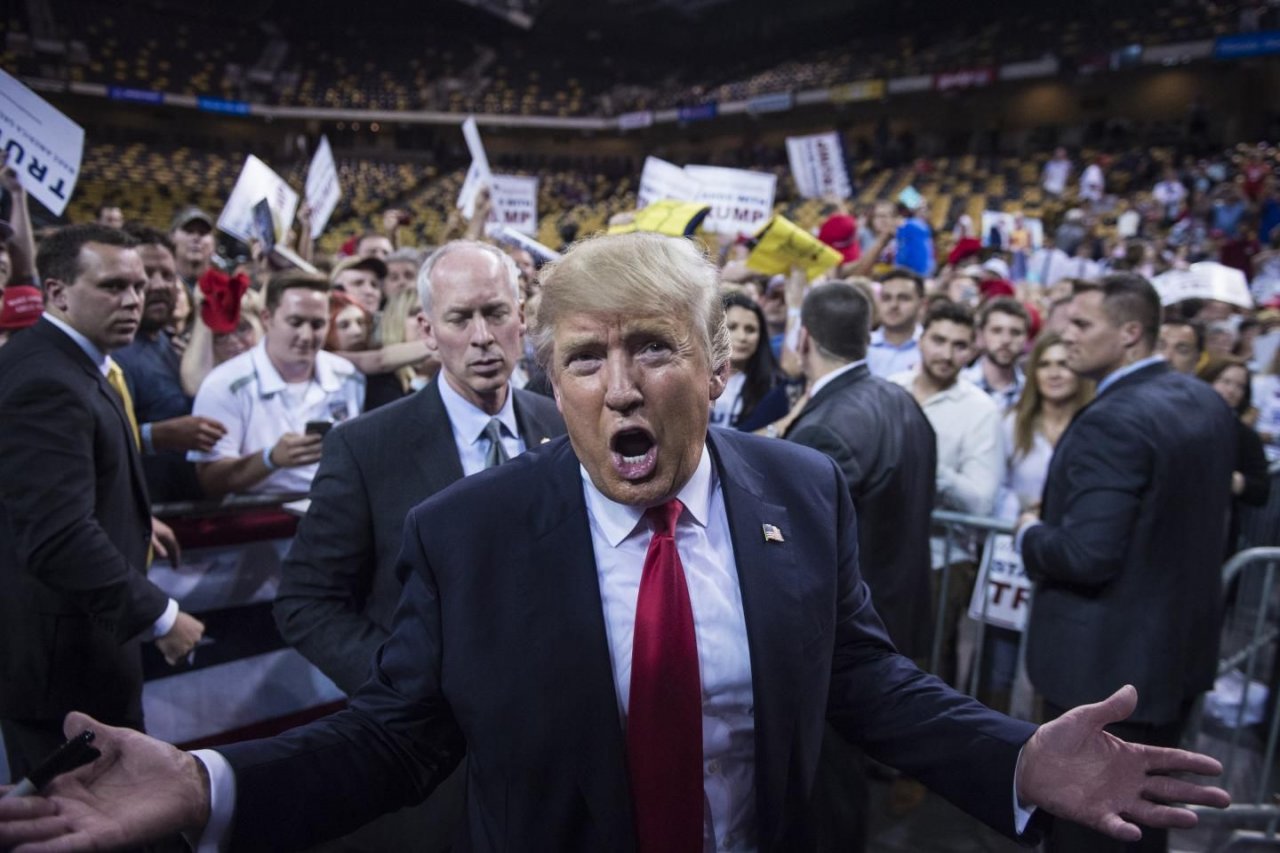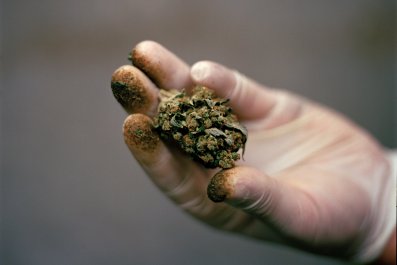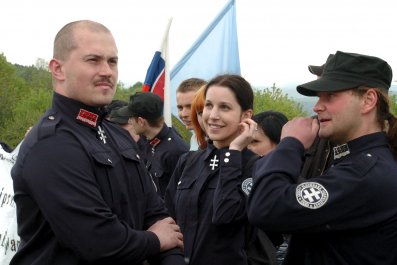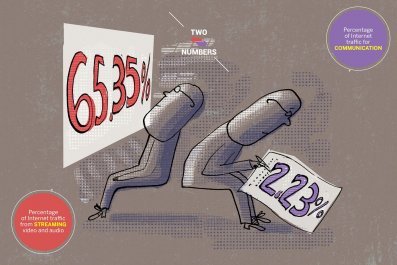January 20, 2017
WASHINGTON, D.C.—Speaking to more than a million spectators, vowing to "make America great again" and declaring that he's a leader who is "a fantastic success, just like my amazing, amazing companies," Donald J. Trump was sworn in Friday as the 45th president of the United States amid continuing demonstrations against what protesters call his racist and anti-immigrant policies.
"When was the last time we won at anything?" President Trump asked the cheering crowd, which was cordoned off from thousands of loud and angry demonstrators. "I've built a fantastic business, employed thousands of people, ran the best campaign, when you look at it, like, ever. Like, better than Lincoln. So the winning starts today."
As the new president spoke, former President Barack Obama, whose citizenship Trump questioned as recently as Friday morning at the traditional meeting at the White House of the new and former presidents, looked away. House Speaker Paul Ryan, still smarting from Trump's remark at a congressional Christmas party that the Wisconsinite "was only elected by a few farmers," clapped politely.
On day one, Trump has already put his mark on the capital. He became the first president to tweet during an inaugural. "These protestors are bad guys. Really bad. Election's over. Get a life. SAD!" After the ceremony, instead of watching the inaugural parade from a reviewing stand at the White House, Trump led the procession as grand marshal and then watched the festivities from in front of the Trump International Hotel at the Old Post Office, the luxury property he opened in September. Secret Service agents and other federal law enforcement officials flanked the new president as he was both cheered and jeered on his walk down Pennsylvania Avenue. The president and first lady Melania Trump will live in one of its presidential suites at the hotel until their renovations at the White House, estimated to cost $6 million and paid for out of their own pocket (including extensive gold leafing in the Oval Office), are finished this spring. "Frankly, this hotel is so, so fantastic, really terrific, that I might stay. I could. I should. I won't, but I could. It's that good."
After the inauguration, the president signed an executive order repealing Obama's executive order that allowed as many as 5 million immigrants without documentation to stay in the U.S. and directed Attorney General Chris Christie to report in 30 days on how to begin deportations. Afterward, the president prepared for the evening balls, which will include a performance by the Christian metal band Stryper. "The evangelicals, they love me!" said the new commander in chief.
Sixteen years ago, The Simpsons broadcast an episode called "Bart to the Future," a Back to the Future parody in which Lisa Simpson becomes "the first straight woman president." Her predecessor? Donald Trump. "He left the country broke," she sighs.
The business of imagining a President Trump goes back even further, to at least 1988, when the slender, blond real estate heir attended the Republican National Convention and was asked if he wanted to run for president one day. "If I did decide to do it...I would have a hell of a chance of winning," Trump told Oprah Winfrey back then. His long flirtation, of course, finally ended last year. The man The New York Times described in 1973, when he was 27, as looking like Robert Redford had evolved into a still-fit, less hirsute, 69-year-old candidate for president with a model third wife, national celebrity and theatrical flair—see his announcement escalator ride that shook the world.
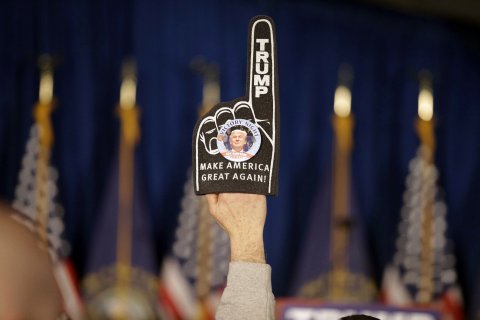
At the time, even if a few pundits saw his potential, no one, not even Trump, saw all this coming. Most thought his campaign was a joke, but over the past two months, some of that early chuckling has turned into dread. John Kasich recently said Trump creates a "toxic atmosphere," and Bernie Sanders, whose supporters have formed a majority of anti-Trump protesters, said the billionaire has "promoted hatred and division." They have a point. In March, after weeks of egging on his supporters to take physical action to eject hecklers, Trump's rallies turned violent. A supporter in North Carolina was arrested for punching an African-American protester being led out of an event by security. "The next time we see him, we might have to kill him," said the defiant man. Days later, Trump had to cancel a rally in Chicago as hundreds of shouting protesters converged on the venue and clashed with his supporters in a chaotic scene that reminded many of the protests that turned the 1968 Democratic National Convention in that city into a historic conflagration.
While Trump has blamed "wise guys" and "bad dudes" sent to shut down his events and "take away our First Amendment rights," Republicans and Democrats speculating about a President Trump have become increasingly panicked. Holocaust survivors have been quoted saying that Trump reminds them of Adolf Hitler. (For what it's worth, Trump's daughter Ivanka converted to Judaism when she married.) The president of Mexico has likened him to Hitler and Benito Mussolini, while Germany's vice chancellor sees parallels between Trump's crusade and the xenophobic far-right parties in Europe, including France's National Front. The comedian Louis C.K. wrote to his fans that "Trump is Hitler," another "funny and refreshing dude with a weird comb-over." On the left, The Washington Post and Slate columnists have likened Trump to a fascist. In a case of rare agreement across party lines, conservatives have used a similar description. Conservative author Matt Lewis has called Trump an avatar of white-identity politics. And the haters have a lot of fodder. The mogul began his campaign saying Mexico was sending the U.S. "rapists," then proposed a loopy and bigoted ban on Muslim immigration "until we figure out what the hell is going on" (whatever that means). Trump continues to lambaste the media at his rallies, referring to them as "the worst." At least two journalists say they've been roughed up at Trump events without provocation—one of them is a woman who writes for a conservative publication and claims it was Trump's campaign manager who left her bruised, a charge Trump's people vigorously deny. This isn't the Beer Hall Putsch, but it is ugly.
Meanwhile, millions of Trump voters believe he really can "make America great again." His I-can't-be-bought wealth, his tough-on-trade tariffs, his wall to keep Mexicans out of the U.S. (thanks, Mexico!) and his art-of-the-deal skills as a negotiator have them convinced he's the right man for troubled times.
All of which is nuts. Trump isn't Hitler. He isn't a fascist either—although he has, despite a career of deal-making, the my-way-or-the-highway proclivities of a Latin American strongman, which would be worrisome if America were Bolivia and not an enduring democracy. (Trump was the inspiration, by the way, for the Back to the Future bully, Biff Tannen.) He's also not a savior. Due to his solipsistic personality and vague, unworkable policies, he could never be what he promises to be if elected. But that doesn't make him the sum of all fears.
The unspectacular truth is that a Trump presidency would probably be marked by the quotidian work of so many other presidents—trying to sell Congress and the public on proposals while fighting off not only a culture of protest but also the usual swarm of lobbyists who kill any interesting idea with ads and donations. Trump has a rarefied confidence in his abilities and, as we recently learned, in his, um, manhood. But what he doesn't have is a magic wand (insert wand-penis joke here). Remember Schoolhouse Rock ? Trump is no match for the American political system, with its three branches of government. The president, as famed political scientist Richard Neustadt once said, has to take an inherently weak position and use the powers of persuasion to get others to do what he wants.
Could Trump blow up those legendary checks and balances and make America a fascist state? Oh, please. The fear of fascism in the U.S. goes back to the '30s and echoes debates that have gone on since Thomas Jefferson charged Alexander Hamilton with being a monarchist. Sinclair Lewis's 1935 novel, It Can't Happen Here, was a heavy-handed warning about a folksy fascist seizing the presidency. In Philip Roth's much better work from 2004, The Plot Against America, a Nazi-appeasing Charles Lindbergh wrestles the presidency from Franklin Roosevelt in 1940 and keeps the U.S. from aiding Britain, which foments a Nazi victory in Europe and less-than-pleasant times for American Jewry. But that's fiction. Trump's more likely to end up like Jimmy Carter—a poor craftsman of legislation and a crushing disappointment to his supporters. Since World War II, only Dwight Eisenhower, Ronald Reagan, George H.W. Bush and Bill Clinton have left office with high approval numbers. Presidents generally end their tenure not with a bullet in a bunker but with a whimper.
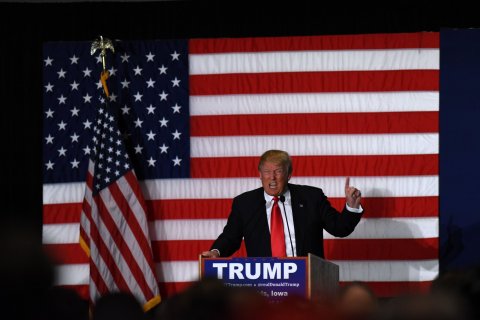
Weimar-a-Lago?
Style is one thing a president can bring to the office, and Trump's would have plenty of bling to go along with his braggadocio press conferences and endless tweets. Could he paint the White House gold? He'd have to pay for it himself, but it seems possible. Hell, if he wanted to live at his Old Post Office hotel, there's nothing to stop him. Trump could even have the colors of Air Force One redone. Jackie Kennedy did that, using a light blue reminiscent of the sky and even the robin's egg shade of Tiffany & Co. boxes. Nancy Reagan purchased expensive china while embarking on an anti-drug crusade. No word yet on what Melania Trump's cause will be.
But to actually accomplish even modest legislative goals, let alone become a 21st-century führer, is beyond the mogul's ken. Philosopher Leo Strauss coined the term reductio ad Hitlerum, the common tendency to reduce all arguments to Hitler, or to always see an action leading to Nazism. In its more extreme forms, you get statements like "You-know-who was also a vegetarian." Trump's displays of bigotry during the primary, most notably his call for a "total and complete shutdown" on Muslims entering the U.S., are abhorrent, but they don't put the America on a fast track toward the Third Reich—not unless you believe Congress, business, the armed forces, the judiciary and so on are all willing to start setting up internment camps. The U.S., with its unemployment rate of less than 5 percent and minuscule inflation, is a country where retirees try to get better yield, not the hyperinflation Weimar Republic that gave birth to Hitler. Fascism, with its totalitarian control of society and the economy—"Nazi" was short for National Socialists—doesn't describe Trump's views, even if former Maryland Governor Martin O'Malley and Michael Gerson, a former speechwriter for George W. Bush, throw around the term fascist when bad-mouthing the billionaire.
It's Going to Be Yuge!
So if he's not going to be Hitler, what would a Trump presidency be like? Judge him by his words.
"I will build a great, great wall on our southern border. And I will have Mexico pay for that wall."
Leave aside the issue of whether anyone could actually build a wall of that magnitude, which is a big if. (Trump says natural barriers between the U.S. and Mexico mean that we're talking about only 1,000 miles of wall.) Also leave aside that there is no net in-migration from Mexico at the moment. The remaining questions are myriad: Would the wall do as intended? And could Trump really secure the money to pay for it? The answer to both is probably no.
What about Mexico footing the bill? So far, the country has been a tad reluctant. "I'm not going to pay for that fucking wall," said former Mexican President Vicente Fox. Trump argues that Mexico, threatened with tariffs, would gladly cough up the money lest its access to lucrative American markets dried up. But this is fantasy. No Mexican leader could survive appearing to be such a supplicant to the U.S., even if he or she were so inclined.
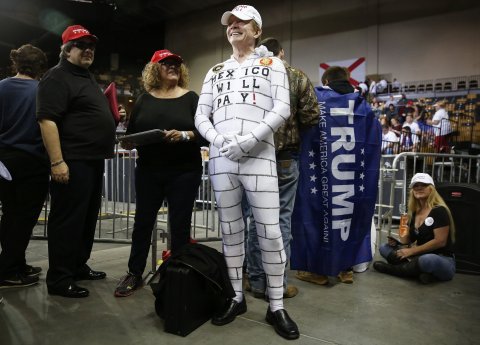
Then would Congress pay for the wall? No, and this gets to the heart of Trump's problem not just with walls but with governance: He phrases solutions in terms of "I," but this is a "we" country. It's hard to see Congress being cajoled into funding that very expensive barricade, especially when Democrats would likely be able to stymie any funding measure with a filibuster in the Senate. Trump could try to galvanize public opinion, but good luck with that. If he just ends up with more drones and Border Patrol agents, he will have accomplished as much on that front as George W. Bush or Barack Obama and left his supporters crestfallen.
"If you build that plant in Mexico, I'm going to charge you 35 percent on every car, truck part that you send into our country. Every single one."
Here's another "I" problem. Trump loves to tell the hypothetical about how he'll get Ford Motor Co. to stop building a plant in Mexico. In his telling, he calls the head of Ford, threatens a tariff and after a day or so the auto CEO relents and opens a factory in the United States. Trump has been telling this fairy tale for almost a year, and yet Ford has gone ahead with its Mexican expansion. Would it be any different if Trump got elected?
Very doubtful. Raising tariffs is hard. You need to run the gantlet of lobbyists and get through the famously tough Senate Finance Committee, where chairmen of past (Bob Dole, Daniel Patrick Moynihan) and present (Orrin Hatch) have wielded the power to tie up tariffs forever. And since a tariff is a tax by another name, there's about zippo chance of getting something like that through a tax-phobic Republican Congress, even if Trump is a Republican president. And even if he could, a unilateral tariff would run afoul of the North American Free Trade Agreement. Mexico could seek redress under that accord. By that time, Ford Mustangs and Fiestas would already be coming off the line in Mexico.
"We are going to replace Obamacare with something so much better."
Trump has recited the standard denunciations of the Affordable Care Act that all Republicans seem to have laminated on a card, but beyond saying he'll loosen regulations on the sale of insurance over state lines—something he says will bring more competition and lower costs—he has been pretty vague about how he's going to improve matters. Plus, he has said he wants to keep some elements of the health care plan, including its prohibition against denying coverage for pre-existing conditions. Insurance companies will balk at that. They signed on to cover pre-existing conditions only because of a grand bargain with the White House that promised they'd see a flood of healthy new customers under the mandate that everyone must buy insurance. In February, Trump seemed to reverse his stance on the individual mandate (one of the most loathed parts of the plan) and came out in favor of it—but then he flipped again, saying he opposed it. So what he really wants to do (as well as what part of that would be better) remains a mystery.
"I would hit them so hard your would head spin."
When it comes to a president's powers as commander in chief, Trump would have a lot of discretion. While only Congress can declare war, presidents have been getting into foreign conflicts all by themselves for centuries. If Trump wants to ramp up the bombing of the Islamic State militant group (ISIS), as he's promised, it's unlikely Congress can stop him. He has talked tough on terrorism—repeatedly vowing to restore waterboarding and then some—but he recently backed down, saying he wouldn't break the law on torture but would try to change it. That's something he'd have to get past Senator John McCain, chair of the Armed Services Committee, who has some thoughts on the subject, having been beaten and imprisoned in a North Vietnamese prison. (Trump once mocked McCain as a "loser" for being taken prisoner so long ago.)
"You know, the great thing about executive orders is that I don't have to go back to Congress."
Ironically, if Trump bigfoots his authority in a way liberals find repugnant, they may have Obama to blame. Ever since the Democrats lost the House in 2010, the president has pushed the limits on executive orders. The Supreme Court is considering Obama's executive order that could allow millions of aspiring Americans to stay in this country. In areas like immigration, climate change, recess appointments and so on, Obama has been very aggressive, arguing for the powers of a vigorous chief executive. Trump has said he'd use executive powers sparingly, preferring instead to work with Congress. But if the temptation to use executive orders proved irresistible to a hope-and-change pol like Obama, bet on Trump to direct the Christie Justice Department—just let those words sink in—to echo Obama-esque arguments in a fight for a conservative view of environmental or immigration laws.
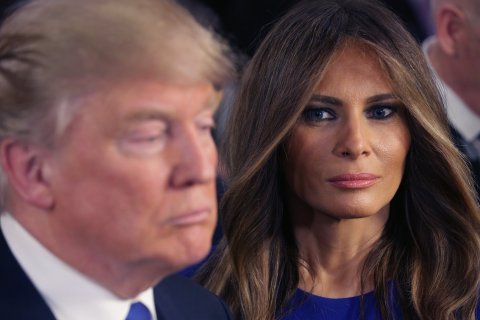
Ouija Bored
The history of predicting how presidencies will play out isn't pretty. Many worried Reagan would be a warmonger. Instead, he signed the biggest arms reduction deals with the Soviets ever and responded to the slaughter of U.S. Marines in Beirut in 1983 by pulling out instead of digging in. In Texas, George W. Bush was a popular governor known for bipartisanship. In Washington, less so. Forecasting the Trump years seems equally perilous. Critics should allow that he could be like Governor Arnold Schwarzenegger—a political novice and ideologically flexible Republican whom some California voters feared, yet who turned out to be way more tepid than the Terminator.
But one thing we know is that Trump is used to having his way. Eisenhower, the last president who had never held elective office before entering the White House, might be the closest thing we have to a useful comparison. Many worried that the supreme commander of Allied forces in Europe would flounder in a system where his commands were not instantly met with a salute. "He'll sit there all day saying, 'Do this, do that,' and nothing will happen," lamented Harry Truman as he readied to turn over the presidency to the five-star general. "Poor Ike—it won't be a bit like the military. He'll find it very frustrating."
It's extremely unlikely anyone will ever utter the phrase "poor Donald." And we should allow for the possibility that, like Eisenhower, he would be a successful president. His business has its eye-rolling qualities (mmm, Trump Steaks), but he does cut deals and, in case you hadn't heard, even wrote a book about it. Trump has positive qualities that detractors should recognize: ideological flexibility, an ability to negotiate, great communication skills. However, they seem easily overwhelmed by his obvious flaws: bigoted policies that target religions and utterances that slander Mexicans, a brash and imperious style, a tendency to hold grudges long beyond their sell-by date. Ultimately, Eisenhower's weak grip on Washington was a contributing factor to the rise of anti-Communist crusader Senator Joseph McCarthy. (To his harshest critics, Trump's own words have a McCarthyite resonance. He gleefully calls Sanders "a Communist.")
That's not to take away from Ike. To his eternal credit, he did send federal troops to Little Rock, Arkansas, in 1957 to enforce a school integration order after the state's segregationist governor refused to do so. Would Trump show equivalent courage? The chronic woes of American life—a public education system that often fails, infrastructure that's always "crumbling," exorbitant health care costs—are problems no more likely to be fixed by Trump's bromides than by Sanders's broadsides, which are similarly politically unrealistic and financially dubious.
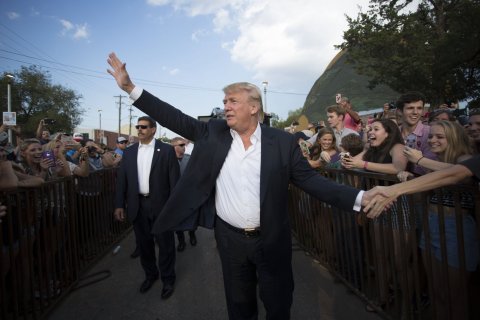
It's more than likely Trump would wind up being just another president on the alphabetical roll call, nestled between the memorable Truman and the utterly forgettable John Tyler, distinguished more by his hue, his bullying and his encouragement of other bullies than by any lasting damage done to a republic that has endured far worse.


